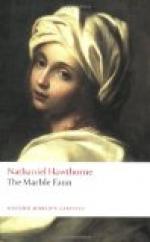The old Englishman and his daughters, in the opposite balcony, must have seen something unutterably absurd in the sculptor’s deportment, poring into this whirlpool of nonsense so earnestly, in quest of what was to make his life dark or bright. Earnest people, who try to get a reality out of human existence, are necessarily absurd in the view of the revellers and masqueraders. At all events, after a good deal of mirth at the expense of his melancholy visage, the fair occupants of the balcony favored Kenyon with a salvo of confetti, which came rattling about him like a hailstorm. Looking up instinctively, he was surprised to see the abbate in the background lean forward and give a courteous sign of recognition.
It was the same old priest with whom he had seen Hilda, at the confessional; the same with whom he had talked of her disappearance on meeting him in the street.
Yet, whatever might be the reason, Kenyon did not now associate this ecclesiastical personage with the idea of Hilda. His eyes lighted on the old man, just for an instant, and then returned to the eddying throng of the Corso, on his minute scrutiny of which depended, for aught he knew, the sole chance of ever finding any trace of her. There was, about this moment, a bustle on the other side of the street, the cause of which Kenyon did not see, nor exert himself to discover. A small party of soldiers or gendarmes appeared to be concerned in it; they were perhaps arresting some disorderly character, who, under the influence of an extra flask of wine, might have reeled across the mystic limitation of carnival proprieties.
The sculptor heard some people near him talking of the incident.
“That contadina, in a black mask, was a fine figure of a woman.”
“She was not amiss,” replied a female voice; “but her companion was far the handsomer figure of the two. Could they be really a peasant and a contadina, do you imagine?”
“No, no,” said the other. “It is some frolic of the Carnival, carried a little too far.”
This conversation might have excited Kenyon’s interest; only that, just as the last words were spoken, he was hit by two missiles, both of a kind that were flying abundantly on that gay battlefield. One, we are ashamed to say, was a cauliflower, which, flung by a young man from a passing carriage, came with a prodigious thump against his shoulder; the other was a single rosebud, so fresh that it seemed that moment gathered. It flew from the opposite balcony, smote gently on his lips, and fell into his hand. He looked upward, and beheld the face of his lost Hilda!
She was dressed in a white domino, and looked pale and bewildered, and yet full of tender joy. Moreover, there was a gleam of delicate mirthfulness in her eyes, which the sculptor had seen there only two or three times in the course of their acquaintance, but thought it the most bewitching and fairylike of all Hilda’s expressions. That soft, mirthful smile caused her to melt, as it were, into the wild frolic of the Carnival, and become not so strange and alien to the scene, as her unexpected apparition must otherwise have made her.




